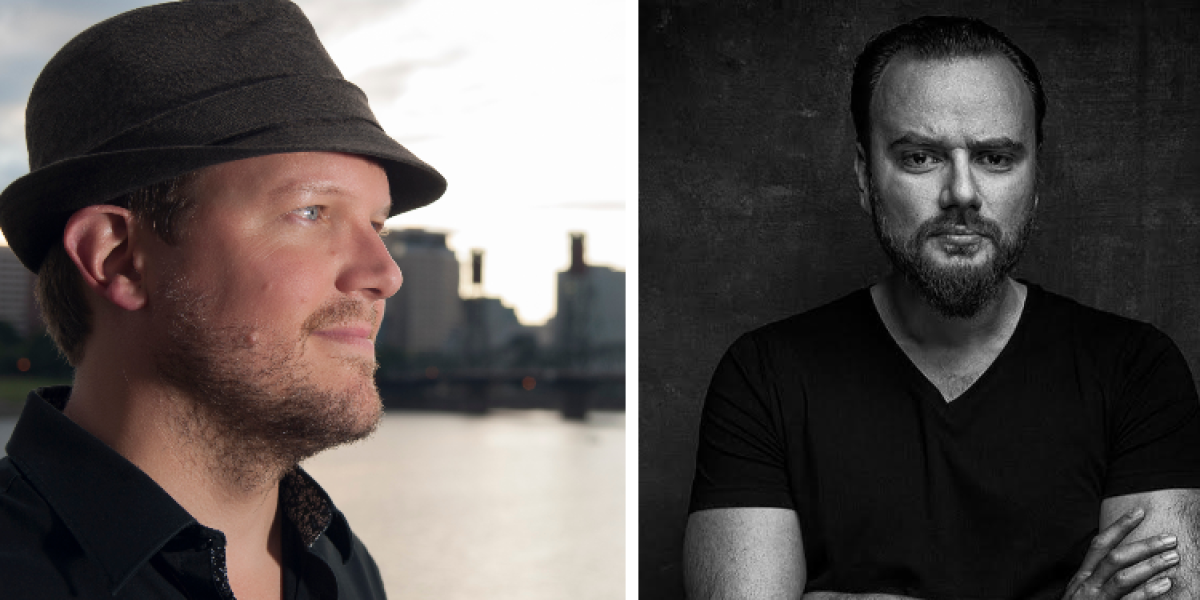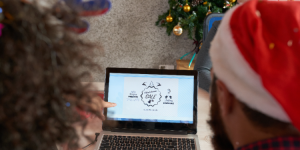
Germany has just voted $500 million to help artists amidst the COVID-19 crisis. Indeed, partial or total lockdowns, empty streets, closed bars, restaurants, cinemas, cabarets, theatres and museums are leaving professional artists backstage. Around the world, artists and freelancers are circulating online petitions while governmental and private organizations are launching crowdfunding, grants or loans. How are musicians, actors, dancers, comedians living abroad... facing the COVID-19 crisis?
We interviewed a French musician living in the United States and an actor from Romania living in Canada.
Eric John Kaiser is a Parisian born musician living in Portland, Oregon. He defines himself as a French troubadour. His last album “Made in Gaspesie” is available online.
Where are you from and how long have you been living in Oregon, USA? What brought you here?
Bonjour. I'm a French singer songwriter, originally from Paris, France. I've been living in Portland, Oregon since 2006. I moved to Oregon, following an American girl I met in Paris. After a few months our relationship didn't work out but I decided to stay anyway. I love American music like folk, blues, indie rock and thought I had a lot to learn by staying here. I have since then released 5 albums and tour mainly on the West Coast, Louisiana, Québec and France. It's been a great musical adventure so far.
How does a French American singer make a living in America?
Mostly by playing a lot of shows. I'm an independent musician and don't have a record company backing me up. I'm only able to produce and release records thanks to the support and the help from my fans, by doing fan funding campaigns on Kickstarter. I couldn't do it without them. Unfortunately I don't sell enough albums, or get enough royalty income from streaming services to be able to make a living. So I have to play as many gigs as possible. At the same time, it helps me improve my sound and my craft. It's always a work in progress, a way to discover new sounds but also to meet a lot of great people on the road. When I'm not on tour releasing a new CD, I play in Oregon and Washington State. Most of the time I perform French songs. A lot of people like French music here. I also mix it up with American rhythms and sounds (from blues, rock and folk music).
On the side, I also do educational programs with French teachers, using French songs to teach students how to speak and improve their French. I also recently did a presentation about French Hip Hop in 5 high schools in the Portland-Metro area. It's always a lot of fun to share French music with students.
How is the Coronavirus crisis changing your life as an artist?
It hit me pretty hard and it happened really fast. I make a living playing gigs so I lost all my gigs and all my income. Also since I'm self-employed at this point I don't get unemployment. I totally understand that it's the best thing to do for our community but it makes things more stressful on a day to day basis.
However to be positive, the pace of my life has slowed down, I'm not on the road all the time, and I'm able to get back to my songwriting and to sharing new songs online. I'm also starting to do some online shows to still connect with my fans, but in a different way. It's pretty exciting that way. It will pass, I just hope too many people don't get too sick and that we get back on track soon. But will things ever be the same as before, I'm not sure. I ask myself that every day. Everything is so global nowadays, Even epidemics...
How do you think it will impact the music industry?
That is a very good question. I'm not sure I have the answer. I'm actually not sure anyone has an answer just yet. In these weird times where everything is standing still (except for the everyday life of the medical staff and other vital services), everyone is online. People also seem to want entertainment so they can get their minds off the news. Maybe after that, more and more shows and music will be online... listening habits have changed a lot already with music streaming services, it might go even more in that direction. However I still think that nothing will ever replace direct human interaction. We will see.
Do you have any advice for other artists who are facing this crisis?
Take some time to educate yourself online, start new projects you have been holding off for a while, write songs if you are a songwriter and call a friend you haven't talked to in a while and tell your loved ones you love them. Life is so fragile and short.
Raresh DiMofte is a professional actor with experience in film, tv and theatre. Originally from Romania, he's living now in Vancouver, British Columbia.
Where are you from and how long have you been living in Vancouver, Canada? What brought you here?
My home country is Romania and now I live both in Canada and Romania with my wife and daughter. We moved to Vancouver exactly 10 years ago right after the winter olympics. We came to Vancouver to work in the film and TV industry.
What are the advantages and disadvantages of being a foreigner actor in Canada?
I do not see disadvantages as a foreigner working in the industry, on the contrary I am using my "foreign" presence to build my niche. I am not saying it's easy but it's one of the duties in my work to find ways to find gigs, create opportunities where I can highlight all my skills, etc.
You are back in Romania, quarantined. How is the Coronavirus crisis changing your life?
My wife and I are producing as well and we came to Romania to find new collaborators and find ways to shoot one of the shows here. We will be back to Vancouver after this mess is over.
We are experiencing unprecedented and unpredictable times and it's still too early to come with a conclusion. But I think a lot of things are going to change, people's behaviour is going to adjust and our industry will be different.
How do you think it will impact the cinema industry?
The industry will survive for sure and it will restart with a boom because people can't wait to go back to work. But we'll have to wait and see how it will go forward in this new era.
What advice would you give to actors in the same situation?
To be prepared like always and start considering writing and producing their own projects. They'll help themselves, our community and industry.



















